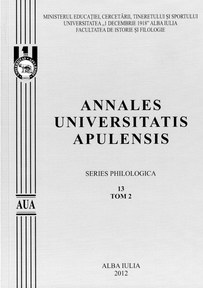The Short Story as Complex Blend: Conceptual Mappings in Hari Kunzru’s Deus Ex Machina
The Short Story as Complex Blend: Conceptual Mappings in Hari Kunzru’s Deus Ex Machina
Author(s): Natalia Gloria MunteanSubject(s): Literary Texts
Published by: Universitatea »1 Decembrie 1918« Alba Iulia
Keywords: CIN (Blending theory); integration; mapping; domains of knowledge; double-scope integration
Summary/Abstract: The purpose of all art is to illuminate for us the extent to which our (as in created by ourselves as a species) metaphors, analogies, blends determine our destinies, ultimately, but more essentially our every step, one by one, as ostensively syllogistically taken by all of us, how they inform our choices helping us to perform our activities, to integrate our knowledge so that we can act in every circumstance, or how sometimes, and maybe just as often, they blind us because they offer themselves for the picking with the irresistible charm of a Jude Law or Angelina Jolie, ready-made and inviting passive adoption rather than active employment. The argument of my study follows along these lines. I am employing Mark Turner and Gilles Fauconnier’s blending theory to show how the characters in Hari Kunzru’s Deus Ex Machina act under the spell of the very determinations Turner talks about extensively in all his work. I am attempting an analysis of Deus Ex Machina in terms of mental spaces, multiple space mapping and domains of knowledge to show how these aspects yield important global insight into the existential questions that Hari Kunzru raises in his short story. In order to do this, to know these determinations that my analysis revolves around, I have to summarize briefly (an almost impossible task) some of the most important aspects of the blending theory, how it is described to work, what is its relevance to humanities in general and linguistics and literary analysis in particular, to discuss aspects of double-scope blending which Turner and Fauconnier consider to be the key to our condition as humans for better and for worse.
Journal: Annales Universitatis Apulensis. Series Philologica
- Issue Year: 13/2012
- Issue No: 2
- Page Range: 399-418
- Page Count: 19
- Language: English

